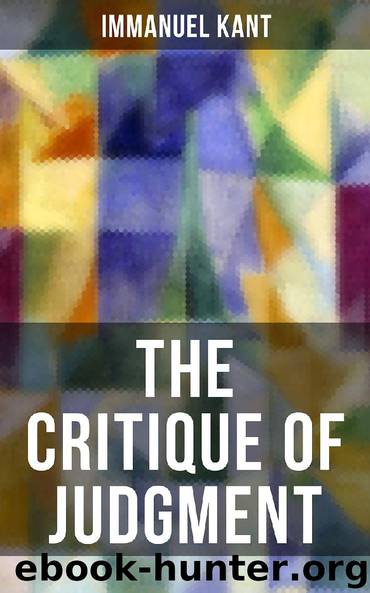THE CRITIQUE OF JUDGMENT by Immanuel Kant

Author:Immanuel Kant [Kant, Immanuel]
Language: eng
Format: epub
ISBN: 9788075837721
Publisher: Musaicum Books
Published: 2017-07-04T00:00:00+00:00
SECOND DIVISION
DIALECTIC OF THE AESTHETICAL JUDGEMENT
Table of Contents
§ 55
A faculty of Judgement that is to be dialectical must in the first place be rationalising, i.e. its judgements must claim universality 99 and that a priori ; for it is in the opposition of such judgements that Dialectic consists. Hence the incompatibility of aesthetical judgements of Sense (about the pleasant and the unpleasant) is not dialectical. And again, the conflict between judgements of Taste, so far as each man depends merely on his own taste, forms no Dialectic of taste; because no one proposes to make his own judgement a universal rule. There remains therefore no other concept of a Dialectic which has to do with taste than that of a Dialectic of the Critique of taste (not of taste itself) in respect of its principles ; for here concepts that contradict one another (as to the ground of the possibility of judgements of taste in general) naturally and unavoidably present themselves. The transcendental Critique of taste will therefore contain a part which can bear the name of a Dialectic of the aesthetical Judgement, only if and so far as there is found an antinomy of the principles of this faculty which renders its conformity to law, and consequently also its internal possibility, doubtful.
§ 56. Representation of the antinomy of Taste
The first commonplace of taste is contained in the proposition, with which every tasteless person proposes to avoid blame: every one has his own taste. That is as much as to say that the determining ground of this judgement is merely subjective (gratification or grief), and that the judgement has no right to the necessary assent of others.
The second commonplace invoked even by those who admit for judgements of taste the right to speak with validity for every one is: there is no disputing about taste. That is as much as to say that the determining ground of a judgement of taste may indeed be objective, but that it cannot be reduced to definite concepts, and that consequently about the judgement itself nothing can be decided by proofs, although much may rightly be contested. For contesting [quarrelling] and disputing [controversy] are doubtless the same in this, that by means of the mutual opposition of judgements they seek to produce their accordance; but different in that the latter hopes to bring this about according to definite concepts as determining grounds, and consequently assumes objective concepts as grounds of the judgement. But where this is regarded as impracticable, controversy is regarded as alike impracticable.
We easily see that between these two commonplaces there is a proposition wanting, which, though it has not passed into a proverb, is yet familiar to every one, viz. there may be a quarrel about taste (although there can be no controversy). But this proposition involves the contradictory of the former one. For wherever quarrelling is permissible, there must be a hope of mutual reconciliation; and consequently we can count on grounds of our judgement that have not merely private validity, and therefore are not merely subjective.
Download
This site does not store any files on its server. We only index and link to content provided by other sites. Please contact the content providers to delete copyright contents if any and email us, we'll remove relevant links or contents immediately.
The remains of the day by Kazuo Ishiguro(7543)
Tools of Titans by Timothy Ferriss(6938)
The Black Swan by Nassim Nicholas Taleb(6184)
Inner Engineering: A Yogi's Guide to Joy by Sadhguru(5888)
Giovanni's Room by James Baldwin(5873)
The Way of Zen by Alan W. Watts(5790)
The Six Wives Of Henry VIII (WOMEN IN HISTORY) by Fraser Antonia(4785)
The Power of Now: A Guide to Spiritual Enlightenment by Eckhart Tolle(4749)
Astrophysics for People in a Hurry by Neil DeGrasse Tyson(4614)
Asking the Right Questions: A Guide to Critical Thinking by M. Neil Browne & Stuart M. Keeley(4567)
12 Rules for Life by Jordan B. Peterson(3724)
The Ethical Slut by Janet W. Hardy(3494)
Skin in the Game by Nassim Nicholas Taleb(3456)
Housekeeping by Marilynne Robinson(3397)
The Art of Happiness by The Dalai Lama(3378)
Double Down (Diary of a Wimpy Kid Book 11) by Jeff Kinney(3267)
Skin in the Game: Hidden Asymmetries in Daily Life by Nassim Nicholas Taleb(3259)
Walking by Henry David Thoreau(3228)
12 Rules for Life: An Antidote to Chaos by Jordan B. Peterson(3196)
